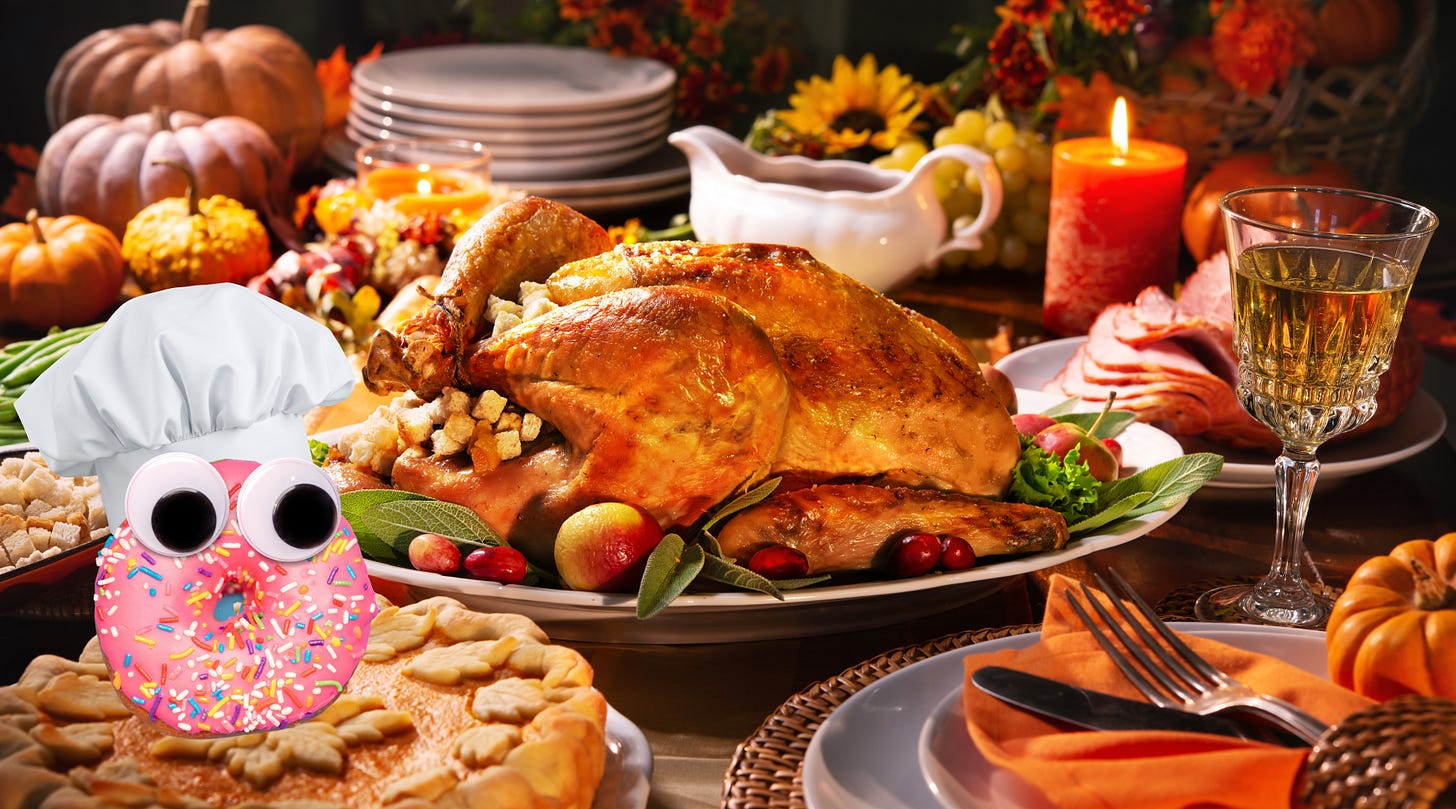🍽️ "The Dinner Party," Part One
Excerpted from one of my favorite essays by Phillip Lopate, "Against Joie de Vivre"
“Perhaps my uneasiness with dinner parties comes from the simple fact that not a single dinner party was given by my solitudinous parents the whole time I was growing up, and I had to wait until my late twenties before learning the ritual. A spy in the enemy camp, I have made myself a patient observer of strange customs. For the benefit of other late-starting social climbers, this is what I have observed.”
—Phillip Lopate, “Against Joie de Vivre”
With the ever-fraught-yet-festive holidays and associated gatherings upon us, if you have ever hidden in the bathroom at a house party or wished you could disappear under the dinner table, these next two Doh posts are for you.
I’m asking for forgiveness not permission1 in sharing my favorite section of a delightfully curmudgeonly personal essay from the inimitable Phillip Lopate. He is a recently retired Columbia professor, and the author of several craft books that opened up the writing world for me, The Art of the Personal Essay and To Show and To Tell.
May this offer you, too, some humor as a ballast for the holiday season. This excerpt (headings are my own) is from one of five sections in Lopate’s titular essay and book, Against Joie de Vivre, described as “a rejoinder to the cult of hedonism and forced conviviality . . . a moving personal testament to the ‘hungry soul.’”
🍽️ 2. The Dinner Party (Part One)
Excerpted from “Against Joie de Vivre” by Phillip Lopate
I am invited periodically to dinner parties and brunches—and I go, because I like to be with people and oblige them, even if I secretly cannot share their optimism about these events. I go, not believing that I will have fun, but with the intent of observing people who think a dinner party a good time. I eat their fancy food, drink the wine, make my share of entertaining conversation, and often leave having had a pleasant evening, which does not prevent me from anticipating the next invitation with the same bleak lack of hope. To put it in a nutshell, I am an ingrate.
Although I have traveled a long way from my proletarian origins and talk, dress, act, and spend money like a perfect little bourgeois, I hold on to my poor-boy’s outrage at the “decadence” (meaning dull entertainment style) of the middle and upper-middle classes; or, like a model Soviet moviegoer watching scenes of prerevolutionary capitalists gorging themselves on caviar, I am appalled, but I dig in with the rest.
Perhaps my uneasiness with dinner parties comes from the simple fact that not a single dinner party was given by my solitudinous parents the whole time I was growing up, and I had to wait until my late twenties before learning the ritual. A spy in the enemy camp, I have made myself a patient observer of strange customs. For the benefit of other late-starting social climbers, this is what I have observed.
As everyone should know, the ritual of the dinner party begins away from the table. Usually in the living room, cheeses and walnuts are set out, to start the digestive juices flowing.
Here introductions between strangers are also made. Most dinner parties contain at least a few guests who have been unknown to each other before that evening, but who the host and/or hostess envision would enjoy meeting. These novel pairings and their interactions add spice to the postmortem: Who got along with whom? The lack of prior acquaintanceship also ensures that the guests will have to rely on and go through the only people known to everyone, the host and hostess, whose absorption of this helplessly dependent attention is one of the main reasons for throwing dinner parties.
Although an after-work “leisure activity,” the dinner party is in fact a celebration of professional identity. Each of the guests has been preselected as in a floral bouquet; and in certain developed forms of this ritual there is usually a cunning mix of professions. Yet the point is finally not so much diversity as commonality; what remarkably shared attitudes and interests these people from different vocations demonstrate by conversing intelligently, or at least glibly, on the topics that arise. Naturally, a person cannot discourse too technically about one’s line of work, so he or she picks precisely those themes that invite overlap. The psychiatrist laments the new breed of egoless, narcissistic patient who keeps turning up in his office (a beach bum who lacks the work ethic); the college professor bemoans the shoddy intellectual backgrounds and self-centered ignorance of his students; and the bookseller parodies the customer who pronounced Sophocles to rhyme with “bifocals.”
The dinner party is thus an exercise in locating ignorance elsewhere. Whoever is present is ipso facto part of that beleaguered remnant of civilized folk fast disappearing from earth.
Or think of a dinner party as a club of revolutionaries, a technocratic elite whose social interactions that night are a dry run for some future takeover of the state. These are the future cabinet members (now only a shadow cabinet, alas) meeting to practice for the first time. How well they get on! “The time will soon be ripe, my friends. . . .” If this is too fanciful for you, then compare the dinner party to a utopian community, a Brook Farm supper club, in which only the best and most useful community members are chosen to participate. The smugness begins as soon as one enters the door, since one is already part of the chosen few. And from then on, every mechanical step in dinner-party process is designed to augment the atmosphere of group amour-propre. This is not to say that there won’t be one or two people in an absolute torment of exclusion, too shy to speak up, or suspecting that when they do their contributions fail to carry the same weight as those of the others. The group’s all-purpose drone of self-contentment ignores these drowning people-cruelly inattentive in one sense but benign in another: it invites them to join the shared ethos of success any time they are ready.
❤️





Sorry Mr. Lopate, about your 'solitudinous' up bringing. My folks put on dinner parties frequently when I was a child. I was a participant, in a way, but as I did not cook, was obliged to interact with the guests. We such luminaries as Pete Seeger, Lee Marvin , and other Hollywood types in our small modest home. Mom made huge trays of lasagna for some parties, and dad made quarts of martinis. By the end of dinner, there was not much food on the plates, but some seconds of mom's gourmet cooking was on the guests. I laughed at the drunken antics. After dinner, desert. which was usually pecan pies and Ice cream, they would go into the living room (just a space adjacent to the table) and play outrageous charades. By that time I was ready for bed, as I had been allowed to drink the horrible retsina turpentine flavored wine with dinner. But I still love the smell of turpentine for some reason....hmmm Reminds of dinner and some the painters we had over.
I like entertain, when I can. I'm not a bad chef, unlike my sister, who learned from ur gourmet chef mother and is a real go-to-hell gourmet cook. I do like good food, and especially meat dishes.
So once in awhile I like to put on a Grand Feed for friends (who generally all know and like each other). Arrogantly, the meal is prepared by me as a great performance of my cooking ability, with no effort spared in detail, preparation or presentation. Julia Child helps me! My greatest pleasure is seeing my friends go back for seconds and thirds (we're all gourmands) and eat to satisfaction.
It is a way for me to show my love for these people I call my current family
Some of the epic feeds I have put on have been legendary for decades..this is love reflected back to me. And we all still laugh about the times we've had.
I am NOT a chef. I am a mechanical restoration craftsman, who spends his time working with dirty hands and hot metal, but I love and can reward my friends with good food.
Phillip Lopate. Sorry you never felt included or loved in any celebrations. I lost my parents young, but had a taste of inclusiveness that I can still savor in my old age.